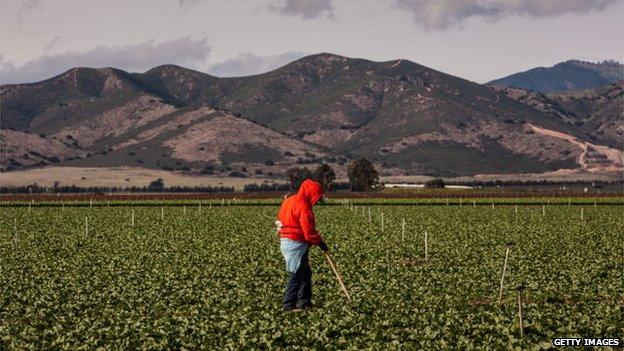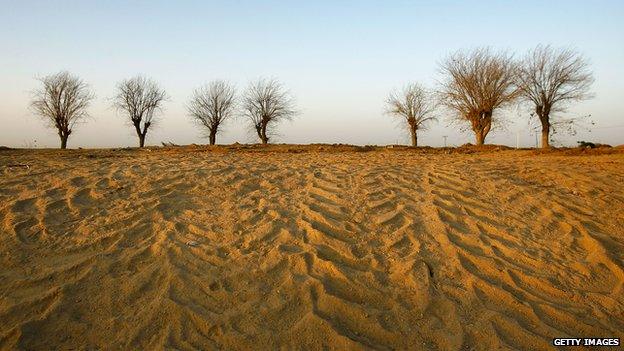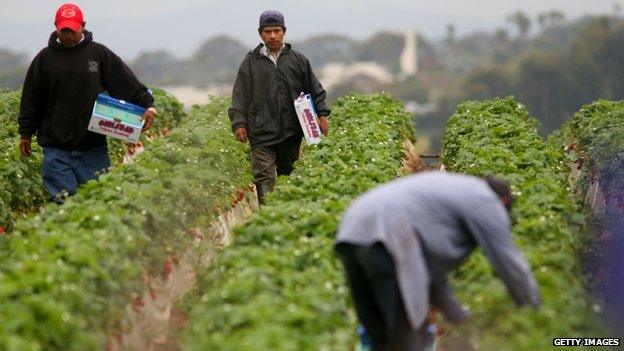Mark Mardell: 'Illegals' and the Grapes of Wrath
- Published

The Fruit Tramps, external belt out their eponymous anthem to the delight of the line dancers stepping out, back kicking, hip wriggling, at the Crystal Palace music hall.
"They call us fruit tramps! Okies! White trash! Get off a my land!"
They sing of grandpa and a loaded car, and so history is kept fresh.
I'm told this town was derisively nicknamed Okieville after the migrant fruit pickers who came to find a better life in California, just like the Joads in Steinbeck's The Grapes of Wrath.
I'm retracing part of their journey for Radio Four's Broadcasting House, reflecting on what has and hasn't changed in America, as my time here draws to a close.
Like the Joads, I cross the desert on four wheels. Unlike them I don't have to do it at night to avoid the heat.
Air conditioning is a wonderful thing. It means I can appreciate the landscape of flat dusty earth, dotted with low scrub, the mountains rising like sand dunes in the background.
Unlike the Joads, I don't have any trepidation as I approach the customs - like barriers of the agricultural inspectors.
After all I only have a small suitcase in the back, not Grandma's dead body. And there's no one at the checkpoint anyway.
At a local museum in Barstow, I meet Ruben, who's in his 80s. His dad crossed the border from Mexico legally. Well, sort of legally.
He had a letter from his town council saying he was a good guy and the Americans gave him a number.
He got a better welcome than the Okies whom Ruben remembers as a child.

A former farm has gone to dust near Bakersfield
His dad was a railway worker and they would come off the freight trains, tired, hungry and worn down. His mum would give them some tortillas.
He tells me the poor people stuck together; it was the better-off who called them names. Steinbeck would have liked that.
He reflects that it's now Latinos who get the abuse. He scorns the common term "illegals".
"We're all illegals on this continent."
The land was taken from the Indians, he says, repeating, "We're all illegals".
I reach the valley, just the other side of the mountains from the desert but a different world, lush and verdant with neat rows of crops - garlic, green peppers, watermelons, orange trees and grapes - whether of the variety wrathful, I cannot tell.
The Federal Camp near the marvellously named Weedpatch, where the Joads find some respite from the cruelty of the growers and their mates in the local police, is still there.
I'm looking at one of the original tin shacks when a man who's doing some electrical work tells me he was brought up here. It's now about 46C (115F) and it's too hot to move fast.
Picking in this heat must be a trial. He says they used to open the metal flaps and run a sprinkler down the metal, a sort of primitive air conditioning.
His dad came from Oklahoma in the 1940s, and the whole family picked fruit in the surrounding fields.
It's not a surprise that this shack is being restored as a historically important building.
What is surprising is that in the rest of the camp there are now rows and rows of neat bungalows - topped with air conditioning units - for current day migrant workers, nearly all Latinos.
This housing is provided by the company, some say only because of union campaigns.
Most adults here don't speak English, although their kids do and they all tell me they love it.

One man from Texas says he comes every year, from May to October. He says everyone here has green card, is here legally.
But there are many in the state who are not.
Leonardo is 23 and was brought here by his mother when he was three. He doesn't like the term "illegal immigrant", he says it wasn't his choice and prefers "undocumented".
He has to drive to work and tells me, without a driving licence, every trip he makes he's nervous.
If he's stopped he could be deported back to a place he can't remember. He sees nothing wrong in his mother breaking the law and others doing the same right now - he says poorer people should have a right to come to richer counties.
But then he surprises me, condemning some of those who come across the border as rural, ignorant, unwilling to learn English or change their ways.
He's not an American citizen, but he feels like one and in these remarks seems as dismissive of newcomers as any politician wooing his base.
Steinbeck's Joads are today the Joados, here in California but they could be the Jodakcz in the UK.
No-one has figured out how to square this circle - in the US no-one doubts the tortuous route to legal immigration is broken, but it is a microcosm of a bigger problem worldwide.
Those who most celebrate market forces see the logic of the free movement of people, and the bosses' desire for cheap labour.
But they are also the most wary of a sense of cultural infringement and the resentment of the local population, fearful of wages being driven down and their area changing.
Listen to my piece on BBC Radio Four Broadcasting House this Sunday.
This is probably my last blog here, before I move back to the UK to present the World this Weekend.
I'll have a blog there too, so keep following me. It's been fun, fare thee well.
- Published11 June 2014
